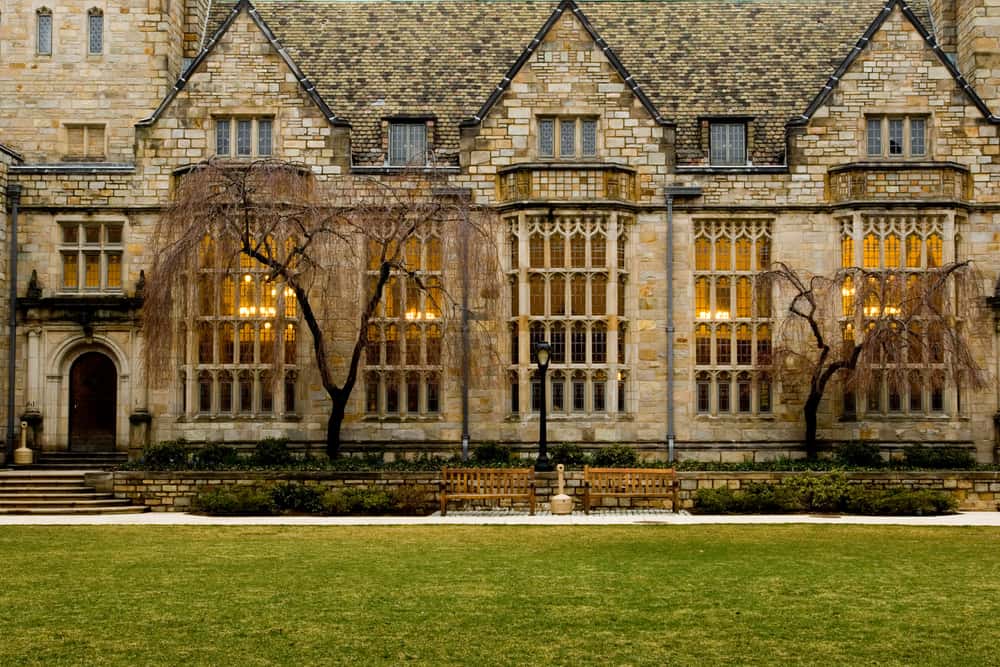
If your child is aiming for the most elite schools – the Ivies, MIT, Stanford and a few others at the very top of the rankings heap – you might be wondering how many Advanced Placement courses he or she must take.
The short answer is “a lot.” But how many are necessary, depends greatly on how many AP classes that other super achievers at your child’s school end up taking.
What families don’t understand is that students applying to these elite institutions will be compared to other applicants who are applying from their own high schools. It won’t matter if the high school your child attends doesn’t rank students. Colleges will do this themselves by comparing applicants from within the same high school during the admission process. And one point of comparison is each child’s AP load.
I am providing an inside look at what it takes to get into these schools thanks to Parke Muth, who was the 
Muth’s candid remarks about how many AP classes are required to get into these top schools should scare ambitious students who attend excellent private and public high schools where there are many accomplished students. And this would be a good thing if it would encourage them to broaden their college search!
I think it’s emotionally unhealthy for students to fixate on the college rankings darlings. And it’s also risky because the chances of getting into these schools even when children ruin their teenager years pursuing them will usually fail anyway.
Muth tackled the AP issue by answering the student question below.
Parke Muth’s Take On AP Requirements at Elite Colleges
Next year, when I’m a senior, I’ll be taking 4 AP classes and an additional college level science class at a community college. That being said, I would like to take a very easy, non-college prep class, so I can have a break during the day. Will this be held against me while I’m applying for universities?
*Note: I’ve been playing the bassoon in the band since I was 11, and I plan on taking music again next year too.
Muth’s Answer
I guess I will step in and say that taking an easy course may hurt you, in part depending on your secondary school, and in part on the colleges and universities you are applying to.
For example, some secondary schools such as the ones in California require you to take what will be perceived in admission offices as a non-academic course. In this case taking the course would never hurt you. At other schools in other states the story may be different.
First of all, you need to find out what the competition is doing. By this I mean your fellow classmates. If you are trying to get into the most selective schools in the country and there are students at your school taking six or seven APs in the senior year (yes this does happen), then when the admission officer looks at your program he or she may downgrade it.
Advanced Placement Arms Race
I think the arms race over the number of APs a student can take is not useful; in fact, several studies show that beyond a certain number (most say five), more AP classes no longer predict better academic success. But it is true that Bill Fitzsimmons, the Admission Dean at Harvard, has written that the best predictors of success at Harvard are APs/IBs and AP/IB scores.
Comparing Students Without Ranks
Remember that many schools read applications individually first, but as the process nears the end, most go through a “school group review”. What this term means is that a computer program runs the list of all applicants from all secondary school along with the decision, test scores and some other rubrics. (Whether a school ranks or not, the computer list orders students by rank or GPA rather than alphabetically. Even schools that don’t rank still give GPA, so that the group of applicants itself is “ranked”).
The person looking over the school group checks to see if there are anomalies (someone with a lower GPA getting an offer for example) and checks to see if that person should be moved down compared to another applicant. Or it could be a student with a great GPA who was dinged could be moved up.
But when push comes to shove, near the end of the reading season, spaces are at a premium and sometimes schools need to cut out those to whom initial readers had slated for offers. These students often then become a part of the wait list.
A reason to move a student to the wait list could might come up when an admission officer looks at the school group and compares academic programs among students. If there are a fair number of students taking more academic courses than you, then you may end up in trouble.
Looking at the Numbers
At some colleges admission readers will create a set of numbers that looks like this: 1-5-5-5-6. What does this mean?
These numbers indicate how many academic prep classes (what some call academic solids) you are taking in a particular year. If you are hoping to get into a highly selective school then you should to be taking courses in English, Mathematics, Social Science, Lab Sciences and Foreign Language in grades 9-12.
Most students actually start in 8th grade with algebra and some are taking other academic solids too—foreign language, for example. Students who do not have these five solids all the way through are often looked at as not having a challenging program. Therefore you should have, in terms of solids 1-5-5-5-5 if at all possible. As I have said before some will end up taking more than 5 solids so the total number may look like this: 2-5-5-6-7.

In addition, some schools also track another set of numbers– the number of the highest-level courses taken in grades 8-12. By highest-level I mean courses that are designated as honors, or gifted and talents or AP or IB. Many schools limit the number of honors/AP courses a student can take in grades 8-10 so this calculation might end up looking like this: 1-2-3-4-5.
If this set of numbers looks like other top students in the school then this is good news, but if more than a few have this: 1- 2-3-4-5-7 and you still have the 1-2-3-4-5, then your program will be perceived by some as significantly weaker than some of your peers. Some colleges (and secondary schools too) weight the honors/AP courses in calculating the GPA.
Those who have taken a lot more of the toughest courses often end up with a GPA well above a 4.0. Even if you have all A’s, but have not taken the same number of weighted courses as others, your overall GPA will likely be lower. This will affect your rank in class, if the schools ranks, and even if they don’t they will still compare your GPA will others who have applied from your school (see above).
I am addressing this response to those students applying to the most selective schools, where even a little thing like an easy course or two, in combination with something else (a less than great SAT 2 score or essays that are GNG –‘good not great’ in admission speak), can encourage a reader to make a case that the student does not stand out academically.
At selective schools, all the applicants (or almost all) have done well by taking tough programs and earning high grades. That’s why they apply to top schools. If I have scared you, then I think I have done my job. Program and performance are key to getting in at highly selective schools. (There are exceptions, but not many: some athletes or others with special talents, development office cases etc.).
Broaden Your College Search
But if I have scared you I also want to reassure you too. There are just not all that many colleges that are incredibly selective. But there are hundreds and hundreds of great schools that you could attend to get a wonderful and life-changing education. I am not just saying this to be nice. There is plenty of data to back this up.
I encourage you to read the piece that Frank Bruni, an Op-Ed columnist for the NY Times wrote. 
The horror stories of top students in high school get headlines, but the fact is most students get into schools that they love. If you can look at the process as finding a fit rather than a contest to get into the most selective schools in the world then you will be a lot less stressed through the process.
If you are bound and determined to go to a highly selective school, then the next step is for you to contact the schools you are thinking of applying to and asking them about your program choices. The problem with this is that some schools will say they want to see ‘the’ toughest program you can take and still do well, but if you ask for specifics they often won’t necessarily tell you what this means.
No one will come right out and say you have to stack up seven APs in the senior year, as it is not true for all students they accept. But if you are not ‘hooked’ in some way, it is often the case that they will expect you to have as good or better courses than your peers.
I do think if you can contact a few of your top choice schools and give your information at least you will have it in writing (email them, don’t call) what advice they gave back to you.
For the most part, I have tried to be overly scary in my response simply because I have seen great students not get in to schools because of a program that, while very strong, was not deemed as competitive as others enrolled in the same secondary school or same demographic group. I hate playing the bad cop here, but thought I should at least give you another perspective.
Finally, a school that would base a decision on something like this may not be a place you would want to go to anyway. I think you should do what you want here, but should you do so, you have to be aware there are, perhaps, some consequences attached.
Learn More!
The No. 1 way to cut the cost of college is to become an educated consumer. You can learn how by attending my popular online course, The College Cost Lab. I’ll be relaunching the course in September, 2016. If you’d like to be notified when I have more details, please click here!





Hi,
I am a green card holder. I came to U.S. in my freshmen year of high school. I’m working really hard to maintain a GPA about 4.2 right now, but I haven’t taken any AP yet (I’m a current sophomore). I can take at least 2 AP classes in my junior year, and my classmates and friends all plan to take 5 or 6 ap classes. I can definitely take more in senior year, but I heard the college cares more about your classes in junior year, because it cannot receive my senior year’s grades. It can only see what classes I have chosen (some applications start in the first semester of senior year). I am so worried that I’m not competitive enough. Yeah, I’m kind of ambitious. I want to go to top 30 colleges. So can you give me suggestions rather than consolations?
Hmm. How to get a hook?
Legacy. Too late for that.
Very wealthy parents. Hah!
Celebrity parents. Maybe but it’s a long shot.
Minorities. Not the last time I looked.
Recruited athletes. Not that I’m aware of.
I am a high school senior looking to apply to Ivy League and other top ranked universities. To date I ave taken AP World History, AP US History, AP European History, and AP Chemistry and have gotten fives. I am taking six full credit courses (AP Economics, AP English, AP Biology, Honors Calculus, Honors French III, and Honors Theology (a requirement)), and a half credit of Government. I have the option to add in AP Art History. This would mean that I would be taking on a significant amount of additional course work and would have a very full school day with only a 20 minute break each day. I love the subject, but could satisfy that love by visiting museums or taking an Art History class in college. Is it worth adding in the extra course from a college admissions standpoint?
What if a school has no ap or ib classes how will that effect an individual also what if the individual was only offered a year of ib classes because the school just became approved for them? Please help
My son, Freshman in high school, is suggesting to self-study or take on-line course of Algebra II, and Chinese II during the summer so that he can start taking higher level classes (Pre-AP and AP classes) in Sophomore year to get more weight into his GPA. I guess this relates to the title of this blog, “how many AP classes do you need for elite colleges” because there are sequential order you need to follow for math, and language classes. AP Calculus class is offered after taking Pre AP Algebra, and Pre AP Calculus, etc. My intuition is telling me that this is not necessarily the right thing to do even for elite colleges. Any inputs are appreciated.
I want to share with you some very interesting info we learned when visiting colleges recently with our daughter. We were told that AP classes are becoming a very tricky situation. While the college gives college credit for students for AP classes, students are finding that when they apply to graduate programs, those schools will not accept their AP credits. As a result, they find themselves short of enough credits and aren’t able to be accepted into graduate schools. The colleges are telling students that even if they can get college credit for an AP course, it’s better in the long run to actually take course so that they don’t run the risk of being rejected from graduate programs due to lack of credits.
Also fewer colleges are giving weight to AP grades.It used to be that if you got an A- for example in an AP class it would be boosted so you were given an A. Colleges are now not boosting the GPA’s anymore so that it’s really much better to get an A in a regular class than a B in an AP class.
At least here in Michigan, in order for a school to be a “high performing” school and receive more money from the state, schools need to offer AP classes and the students need to score well on the AP test. The more AP classes then better. As a result, students have a huge amount of pressure on them to take AP classes. My daughter was taking an AP History class. She had homework over the summer and on the first day of class in the fall had to turn in 3 papers. When we went to conferences, parents were expressing their concern about the amount of work and the teachers response was that his students had some of the highest scores in the country on the AP exam. My daughter was getting an A in the class but she wasn’t getting any sleep! So we had a long talk and she dropped the class. The regular history class taught the same content but without the ridiculous amount of work. Now she is taking an AP English class which she really enjoys because she loves English and she is getting an A in that.
So I think that the lesson we’ve learned is that AP classes really aren’t as important as the high schools try to tell us. My daughter and her friends have been told that they must take AP classes to get into college but that doesn’t seem to be the case. AP classes are good for preparing you for college but it’s better to take the course in college than take the credit. You’ll do better in the intro courses, and you don’t run the risk of being rejected from grad school because they don’t accept AP credit.
I have gotten to know and respect Parke but I want to add my two cents. If a student has some idea of their career direction I see no issue with taking courses that might help in it. For example, I see nothing wrong with taking auto mechanics or CAD drawing as an elective in addition to Calculus and Physics if the student wants to be an engineer.
College admissions officers will treat direction as a positive unless they work at the most selective schools. The admissions officers at those might respect the future mechanical engineer, as one example, for making a commitment to a craft, but they also have applicants who stuck with the more demanding non-STEM classes. I don’t envy the decisions those people have to make.
What about homeschoolers? will they be grouped together, or is each home-school considered a private school? Will the child be compared to his sibling who got in the same ivy he/she is applying to?
So basically this means take full advantage of what your school offers, enjoy your HS experience. Show what your passion is and show a interest in what you want to do in life by volunteer experience?
In your experience, how do top flight universities view community college courses taken while in high school vs. AP courses?
I don’t have too much experience, but I can tell you what I know.
As far as I have heard, I would recommend taking AP classes. First, sometimes these classes are weighted for the GPA while community college courses are not (depending on the schooling district). Second, many colleges and universities, especially out of state, would rather have you retake a community college course at their school than if it was taken as an AP course. This is because they do not know exactly how the community college course was taught or graded, contrary to AP courses, which have specific, national standards for the class. Finally, with an AP course comes the option of taking the AP test for it in May. This is an easy and quick score for colleges and universities to use when comparing applicants, unlike receiving a “pass or fail” from community college courses.
Of course, community college course cannot be ruled out by these factors alone. The student should decide which is the best fit for their learning style, in order to succeed in their classes. Hope this helps!
The only hook from your list is that she is mixed race. The rest don’t apply. Again, never thought it possible-
My advice to people who want ivies…make SURE you know exactly what you are REALLY getting yourself into.
We are not ivy people and don’t buy into the hype of a famous name, or ranking status at all-
The trouble is, IF you do get accepted, it’s very hard to walk away, whether it’s a good fit or not….you will be tempted to go anyway because you think it will get you somewhere.
DO NOT EVEN APPLY if you are not fully knowledgeable and invested in the true ivy experience.
Hi – That explains it. Your daughter did have a hook.
Parents should know that if one parent is white and another is Hispanic, black or Native American Indian, you should put the latter race on the application. If one parent is black and another is Hispanic or Native American Indian, look to see which minority is least represented at a particular school and then check that box on the school’s application. You can check the breakdown of race, ethnicity on a school’s profile on the College Board. You should not just check a box that says more than one race because then you won’t get any affirmative action boost.
While minorities can enjoy an admission advantage at some schools, it doesn’t happen nearly as often as conventional wisdom would suggest. The biggest affirmative action programs help rich students. Most colleges and universities have need-aware admission policies which favors affluent students.
I do agree with this parent who says most people don’t know what they are getting into with the Ivy experience. It can be a rough experience if a child isn’t wealthy.
Lynn O.
My child and 4 others from her HS all applied to ivies. The other students had science research, tons of AP’s, one was valedictorian… They all had higher GPAs and extensive extra curriculars and leadership.
They did not get into any ivies.
My child had only 4 APs with grades of 3’s and 4’s… 2 different high schools, No science research, under a 4.0 GPA…
And got into 3 ivies.We never expected it.
Grades are NOT the end all be all of admissions. Can we give this a rest please?
Hi – I agree there is too much focus on the Ivies! This is a pipe dream, but I wish students would stop applying to these schools!
Students also have a greater chance to get in if they have a hook. When they have a hook, their academic profile doesn’t have to be as strong. Don’t know if that applies to your child. Here are the hooks:
Legacy.
Very wealthy parents.
Celebrity parents.
Minorities.
Recruited athletes.
Lynn O.